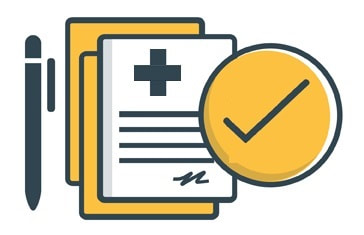Compare Health Insurance - The Definitive New Zealand Guide
Compare health insurance policies from Southern Cross, AIA, nib, Accuro, AA and more that suit your needs and budget
Updated 7 February 2024
Know this first: What is health insurance?
Health insurance, also known as “medical insurance”, covers the cost of any private medical treatment you receive for ‘acute’ conditions. You pay a premium to cover you for treatment for an acute condition, such as diseases, illnesses or injuries. There are many different policies available, generally offering more coverage/treatments the higher the premium. In summary:
Health insurance, also known as “medical insurance”, covers the cost of any private medical treatment you receive for ‘acute’ conditions. You pay a premium to cover you for treatment for an acute condition, such as diseases, illnesses or injuries. There are many different policies available, generally offering more coverage/treatments the higher the premium. In summary:
- You pay a fee (usually fortnightly, monthly or annually) to an insurer who in turn pays out expenses related to medical treatments, i.e. hospital care, surgery and post-surgery care.
- You are treated with priority, meaning there is no waiting list or referral process. You get treated without delay.
- Treatments and care are done outside of the public system, i.e. at private hospitals and clinics.
Summary
To help you decide if you need health insurance, and how to get the best price and policy if you do, our guide covers:
Important: Our comparison includes seven major health insurers - AIA, nib, Accuro, Southern Cross, AA Insurance, UniMed and PartnersLife. If you need a quote from another insurer, we suggest getting a quote from your bank and/or a specialist health insurance broker.
Advertising Disclaimer: MoneyHub may earn a referral bonus for anyone that’s approved through some of the below links. Our research and findings are independent of any bank, credit card issuer, or product manufacturer/service provider, and have not been endorsed by any of these entities. Please see our Advertising Policy for more details about how we make money.
Related Guide: Due to the ongoing hospital issues throughout New Zealand, we have published a guide for anyone considering going to Australia for Medical Treatment
- Health insurance can be regarded as a luxury in New Zealand - our state healthcare system offers every medical procedure a standard insurance policy covers.
- The cost of cover ranges based on age, health and gender. Women of equal age and health can pay around 10% more than men for the same health insurance policy.
- You can buy different types of policies that offer various levels of cover, at varying costs. Quotes and policy inclusions vary, so shopping around is essential to save the most on basic cover.
- Like all insurance, the level of excess influences the policy price. From our examples, we found consumers could save around 30% by taking a policy with an excess of $500 or $1000 when compared to a policy with zero excess.
To help you decide if you need health insurance, and how to get the best price and policy if you do, our guide covers:
- Health Insurance Basics
- Choosing a Policy that Covers You
- Understanding Health Insurance Exclusions
- Frequently Asked Questions
- Need-to-Know Health Insurance Facts
- Compare the Best Health Insurance Policies and Prices
- Claiming on Your Health Insurance
Important: Our comparison includes seven major health insurers - AIA, nib, Accuro, Southern Cross, AA Insurance, UniMed and PartnersLife. If you need a quote from another insurer, we suggest getting a quote from your bank and/or a specialist health insurance broker.
Advertising Disclaimer: MoneyHub may earn a referral bonus for anyone that’s approved through some of the below links. Our research and findings are independent of any bank, credit card issuer, or product manufacturer/service provider, and have not been endorsed by any of these entities. Please see our Advertising Policy for more details about how we make money.
Related Guide: Due to the ongoing hospital issues throughout New Zealand, we have published a guide for anyone considering going to Australia for Medical Treatment
Health Insurance in a Nutshell - Our View:
- Health insurance policy costs vary between insurers - comparing is the best way to get the best deal. Never go direct to an insurer without other quotes in hand. And be sure to disclose everything - if you don't, any claim you make could be rejected.
- While Southern Cross appeared to be the best value health insurer from our quote sample, every person or couple will have different needs and pre-existing conditions.
- We strongly suggest using a comparison tool; LifeDirect is the most extensive and allows you to quote and buy insurance from leading health insurers such as Southern Cross, nib, AIA, Accuro and others. All have strong credit ratings, meaning the insurers will pay if and when you need to claim for medical treatment. In such instances, LifeDirect handles that by liaising with the insurer.
Health Insurance Basics – what is it, and what is covered?
Health insurance, also known as “medical insurance”, covers the cost of any private medical treatment you receive for ‘acute’ conditions. You pay a premium to cover you for treatment for an acute condition, such as diseases, illnesses or injuries. There are many different policies available, generally offering more coverage/treatments the higher the premium. In summary:
- You pay a fee (usually fortnightly, monthly or annually) to an insurer who in turn pays out expenses related to medical treatments, i.e. hospital care, surgery and post-surgery care.
- You are treated with priority, meaning there is no waiting list or referral process. You get treated without delay.
- Treatments and care are done outside of the public system, i.e. at private hospitals and clinics.
Do You Need Health Insurance?
With New Zealanders offered some of the best free public healthcare in the world, private health insurance is arguably very much a luxury and not a necessity. Waiting lists aside, New Zealanders enjoy comprehensive medical treatments when they need them, and free aftercare. Irrespective of your income level, savings or age, you have the same right to medical care as the next New Zealander when you need it.
New Zealanders take out health insurance policies for many reasons. For example, a personal preference to be treated in private hospitals or the desire to avoid waiting lists. However, health insurance won't cover serious things such as organ transplants, nor will it reimburse you for any cosmetic procedures.
Taking out health insurance
The purpose of health insurance
New Zealanders take out health insurance policies for many reasons. For example, a personal preference to be treated in private hospitals or the desire to avoid waiting lists. However, health insurance won't cover serious things such as organ transplants, nor will it reimburse you for any cosmetic procedures.
Taking out health insurance
- If you decide to insure yourself with a health policy, there are a few ways to bring down the costs per month so that it is more affordable.
- In this guide, we explain how health insurance works, the best offers and deals available and important things to know.
The purpose of health insurance
- It’s important to know that the purpose of health insurance is to cover you financially for urgent treatment and surgeries that you would otherwise wait for on the public/state system.
- Having health insurance does not entitle you to claim for anything medical-related; there are many exceptions to what is covered, as we outline and explore below.
Choosing a Policy that Covers You (for what you are likely to need)
A policy's fine print is what matters the most . Basic health insurance cover should include the following:
Your individual needs will help you decide how much cover you need. It’s pointless insuring for GP visits if you rarely visit the doctor and/or can afford them, but at the same time being under-insured could create stress for you and your family later on if your cover is not enough to pay for the medical treatment you need.
- Surgical cover – for example, surgery for acute illnesses such as cancer
- Non-surgical cover – for example, allergy treatment
- Major diagnostic tests – covering procedures like biopsies and mammograms
- Non-Pharmac cover – coverage for drugs not subsidised by Pharmac (essentially the New Zealand Government) for specialised drugs you may need
- Overseas treatment – cover if the treatment you require cannot be performed in New Zealand (although this is rare).
Your individual needs will help you decide how much cover you need. It’s pointless insuring for GP visits if you rarely visit the doctor and/or can afford them, but at the same time being under-insured could create stress for you and your family later on if your cover is not enough to pay for the medical treatment you need.
Understanding Health Insurance Exclusions
To help make sense of what matters the most, we explain “not covered” vs “exclusions” and what the difference is.
Examples of items that (usually) fall under “not covered” (unless your policy specifically permits it):
Examples of items that (usually) fall under “exclusions”:
- Most policies don’t cover specific standard treatments, such as dental care and physiotherapy - these are known as "not covered". We have listed some examples below, but it’s important to check the policy you buy to see what specifically is not covered. The standard treatments that fall under “not covered” are different from “exclusions”.
- “Exclusions” are claims for the medical treatment relating to, or caused by, specific illnesses or conditions that your health insurance will not cover. Examples of exclusions include claims for the treatment of dementia, pregnancy complications and organ transplants.
Examples of items that (usually) fall under “not covered” (unless your policy specifically permits it):
- GP consultations
- Dental care
- Optical care (i.e. contact lenses and/or glasses)
- Allied health treatment such as Physiotherapy, Chiropractor or Osteopathy
- Acupuncture, traditional Chinese medicine and remedial massage
- Speech therapy
- Any mental health treatment
Examples of items that (usually) fall under “exclusions”:
- Chronic conditions (explained in detail below)
- Cosmetic treatment/procedures
- Dementia
- Fat grafting and liposuction
- Gender reassignment surgery
- HIV/AIDS, and any medical condition that arises from it
- Infertility or assisted reproduction (IVF)
- Illness caused or contributed to drug or substance abuse
- Organ transplants, transfusions of autologous blood/blood products
- Self-inflicted illness or injury
- Unapproved healthcare services
Health Insurance Frequently Asked Questions
To help you understand health insurance and how it relates to your situation, our FAQs navigate some common queries.
Do I need health insurance? Can’t I use the public system?
Health insurance works alongside the services provided by the Ministry of Health. If you have a health insurance policy, you are still entitled to full state health services as you would be without a policy. For this reason, health insurance is only of benefit if you want to avoid waiting lists and have urgent consultations and specialist treatment. If you are happy to wait for treatment, health insurance has limited benefits.
What are pre-existing medical conditions, and how do they affect health insurance?
A medical condition for which a patient has already received medical advice or treatment before applying for health insurance cover is a “pre-existing” medical condition. Some health insurance policies cover a limited number of pre-existing conditions. However, it’s standard that applicants with hip or knee conditions, a back condition, cancer or cardiovascular conditions will not be covered for medical treatment that relates to those conditions.
You can still get health insurance, and it will cover unrelated illnesses, but the premium may be higher as you are assessed as a higher risk client.
You can still get health insurance, and it will cover unrelated illnesses, but the premium may be higher as you are assessed as a higher risk client.
What do standard treatments cost in New Zealand? My policy has a limit of $60,000 per year for chemotherapy. Is that enough if I get cancer?
The answer is it depends, and treatment costs could well exceed $100,000 if the cancer is aggressive or returns within one year, or if you need drugs not covered by the government health system. For the certainty of complete care, a popular option is health insurance with unlimited cover for cancer, given it’s the most common cause of death in New Zealand.
What are Chronic conditions and are they excluded from a health insurance policy?
Chronic conditions, such as arthritis or asthma, are not covered by standard health insurance policies, given they need ongoing treatment, monitoring and have no known cure. Insuring such conditions would be impossible as the cost of treatment to an insurer is unknown and no insurer will take the risk. For this reason, chronic conditions are not covered by standard health insurance policies.
If I have a policy and now need treatment, what do I do?
The good news is that the process is largely handled for you. Your GP will contact your insurer to request cover and/or refer you to approved providers. The more comprehensive your policy, the more options you have available for treatment.
Can I switch policies and save money?
- Yes, but be careful. If you are young and do not have any health problems, then there should be no problem.
- However, if you have developed medical conditions after taking out your current policy, then it may be difficult to get cover for such existing conditions as a new health insurance company will see them as “pre-existing medical conditions”.
- As you get older, you’re more likely to be tied to your provider as they know your medical history and will adjust your policy premium accordingly.
- If you are determined to switch, take some time to make sure all the coverage is the same (or better) before leaving your existing provider.
Does my health insurance cover loss of income and mortgage repayments if I become ill?
- In most cases, these situations are not covered. Some policies offer lump sum payment upon a diagnosis to help with family expenses, but health insurance does not cover loss of income or financial hardships.
- If you would like to insure for loss of income or something similar, you are best to do it with a dedicated provider of critical illness insurance.
- Critical Illness insurance is a separate insurance policy that provides a lump sum payment if you develop an illness covered by your policy. You can use this lump sum to pay for family expenses (mortgage, rent etc) while you recover. The lump sum is only paid once.
Will my health insurance policy cover my children and partner?
- No - only family policies cover a family. You can insure each family member separately, although this is uncommon and if any family member has a pre-existing medical condition, it may be cheaper to insure him or her separately.
- Please make sure you are clear about what your family needs, and that the policy you get is appropriate. Our guide below includes best buys for family insurance.
My employer offers a workplace scheme. Do I need to buy cover?
Some New Zealand employers offer a workplace scheme with policies similar to (or the same as) the ones you can buy privately. Check what and who is covered (yourself, or yourself and family) and make sure it’s appropriate for your needs. If you don’t have a scheme, check if your partner's employer may offer a scheme you could join.
How does the public health system in New Zealand work, and how does it compare to private health insurance?
The government primarily funds the public health system in New Zealand. It provides all residents with various healthcare services, including hospital care, primary care, maternity care, mental health services, and more. Some services may require a co-payment, while others are fully funded. Private health insurance complements the public system by providing access to faster treatment, more provider choices, and additional services that the public system may not cover. Private health insurance also helps to alleviate the burden on the public system by reducing waiting times for elective procedures.
What types of health insurance policies are available in New Zealand, and what factors should I consider when choosing one?
Various types of health insurance policies are available in New Zealand, including basic, comprehensive, and specialist policies. Factors to consider when choosing a policy include:
- Your budget.
- The level of coverage you desire.
- Any pre-existing conditions.
- The reputation of the insurance provider.
- Any additional benefits or exclusions.
Are there any waiting periods or restrictions on health insurance coverage in New Zealand?
Yes, most health insurance policies have waiting periods before certain benefits can be claimed. Waiting periods may apply to specific treatments, pre-existing conditions, or for a set period after joining a new policy. These waiting periods can vary between providers and policies, so it's essential to review the terms and conditions of your policy carefully.
Can I get a discount on my health insurance premium if I maintain a healthy lifestyle or participate in a wellness program?
Some health insurance providers in New Zealand offer discounts or incentives for maintaining a healthy lifestyle or participating in wellness programs. These may include discounts on gym memberships, fitness equipment, or other health-related services. You must check with your health insurance provider to see if they offer such incentives and how you can qualify for them.
Are alternative or complementary therapies, such as chiropractic or acupuncture, covered by health insurance in New Zealand?
Coverage for alternative or complementary therapies varies between health insurance providers and policies. For example, some policies may include coverage for specific therapies like chiropractic or acupuncture, while others may exclude them entirely. Therefore, it's essential to review the terms and conditions of your policy to determine what is covered.
Will my health insurance cover me for medical treatment or emergencies outside New Zealand?
Some health insurance policies cover medical treatment or emergencies outside New Zealand, while others do not. Such coverage is often called "overseas travel insurance" or "international medical coverage." If you plan to travel or live overseas, reviewing your policy and ensuring you have adequate coverage for your needs is essential.
Can I get coverage for dental, optical, and other ancillary health services under my health insurance policy?
Coverage for dental, optical, and other ancillary health services varies between health insurance policies. Some policies may include coverage for these services, while others may require you to purchase additional or separate coverage. Reviewing your policy to understand what is included and any limitations or exclusions is essential.
Health Insurance in a Nutshell - Our View:
- Health insurance policy costs vary between insurers - comparing is the best way to get the best deal. Never go direct to an insurer without other quotes in hand. And be sure to disclose everything - if you don't, any claim you make could be rejected.
- While Southern Cross appeared to be the best value health insurer from our quote sample, every person or couple will have different needs and pre-existing conditions.
- We strongly suggest using a comparison tool; LifeDirect is the most extensive and allows you to quote and buy insurance from leading health insurers such as Southern Cross, nib, AIA, Accuro and others. All have strong credit ratings, meaning the insurers will pay if and when you need to claim for medical treatment. In such instances, LifeDirect handles that by liaising with the insurer.
Health Insurance: Need-to-Know Facts (and what to consider before getting a policy)
New Zealand buy Health insurance to cover them for a range of illnesses and ailments, minor to life-threatening. Before taking out a policy, our need-to-know facts explain if health insurance is right for you, how to pick the best provider and get the lowest price.
You may not need health insurance as the public health system covers a lotNew Zealand is one of the few countries that provides its residents with free healthcare. For this reason, we see health insurance as an optional luxury. Additionally, health insurance doesn’t cover every medical treatment – cosmetic surgery and transplants are both excluded, so it’s important to work out what you need before you buy a policy.
|
Consider “Self-insuring” if you are low risk or can afford treatments.If you’re young (less than 40 years of age) and healthy, there is less chance you will need to claim on health insurance. You can save yourself $500+/year and put the money in the bank. If you do need any medical treatment, it’s likely the public health system will cover you. If they don’t, or if you want to speed up the treatment, you can draw down on the money you have saved by not having a policy.
MoneyHub user Debra, a 58 year-old from Northland says: “We pay $6,000 a year and it’s no longer affordable, especially as our combined income is $80,000 and we still have a mortgage. We’re not going to renew the policy when it expires. The public system is pretty good and we see health insurance now as a luxury”. MoneyHub user Don, a 68 year-old from Otago says: “I had health insurance from when I was 40, and it was cheap to start with, but gradually has crept up to $4,000 a year (I’m approaching 70). What I have paid over the years is much more than I’ve claimed. I cancelled it and will put away the savings to fund any treatments required in the future if the public hospital can’t help”. |
Many policies don’t cover pre-existing conditions, but you must check as it’s possible to get cover for your specific ailments
|
Health insurance policies cost more as you get older – there are no fixed priced policies for life.When it comes to the price of policies, here are the key facts:
|
Pay upfront or by direct debit to save moreMost insurers offer discounts if you prepay a year in advance. For example, Southern Cross will offer 2.5% off if you pay by direct debit. NIB will offer up to 4%. Don’t pick a policy based on a discount; the only thing that matters is to make sure the coverage is right for you.
|
Healthy lifestyles save moreMany insurers offer a discount for having a “healthy lifestyle”. For example, Southern Cross offers up to 10% off a policy cost if you meet their requirements (sufficient servings of fruit and vegetables per day, regular exercise for 30+ minutes, consume small amounts of alcohol and don’t smoke)
If you can show your insurer that you have a healthy lifestyle, you are likely to save. |
Ignore perks, rebates and special offers; they don’t matter when it comes to your health."No claim" bonuses are nice to have, and some insurers offer cheap gym memberships, but you must always look at the policy and make sure it suits you. Free gym membership means nothing if you find yourself not covered for an illness you develop.
|
Pick a high insurance excess to get a cheaper policy if you can afford it.
Example Health Insurance Quotes: Joint policy: 40-year-old male and 40-year-old female, both non-smokers
Be aware: If you go for a high excess policy, make sure you have enough money saved to cover the $500 or $1,000 excess fee per claim.
|
Use a price comparison site as a guide, and consider using a broker to get the lowest price and best advice
How to find and choose a broker?Finding a broker to help you isn't so straightforward; our guide to insurance brokers can help. It's also worthwhile asking a friend or family member if they can recommend a broker.
|
Make sure you understand the policy and what it covers (and doesn’t cover!)Once you've checked the comparison sites, brokers, and insurers you should have a shortlist of your best quotes. Whatever policy you choose, first make sure you know all the key features before you buy, then check that you're getting the best price.
|
Compare your policy to our quotesEvery six months we obtain quotes from the big health insurers. To make it comparable, all quotes have no excess (so you pay nothing when you claim). Unlike other insurance, health insurance policies are not easy to compare. The range of cover differs for many conditions, some are standard and some are optional. We present a range of standard cover from each company, but each policy is unique in its offering.
|
Health Insurance in a Nutshell - Our View:
- Health insurance policy costs vary between insurers - comparing is the best way to get the best deal. Never go direct to an insurer without other quotes in hand. And be sure to disclose everything - if you don't, any claim you make could be rejected.
- While Southern Cross appeared to be the best value health insurer from our quote sample, every person or couple will have different needs and pre-existing conditions.
- We strongly suggest using a comparison tool; LifeDirect is the most extensive and allows you to quote and buy insurance from leading health insurers such as Southern Cross, nib, AIA, Accuro and others. All have strong credit ratings, meaning the insurers will pay if and when you need to claim for medical treatment. In such instances, LifeDirect handles that by liaising with the insurer.
Ready to Buy Health Insurance?
Once you’ve become familiar with the basics and have made a decision to get health insurance, it’s time to get the best quote for your needs.
Get the best policy without becoming overwhelmed by the details:
Tip 1 – Read our Best Buy Health Insurance policies below to get an idea of price and coverage
We have put together many quotes from health insurers for a sample of individuals. We understand everyone is unique, and for this reason, the price data is presented as an indicative guide to a range of policy prices available. The purpose is to help individuals understand the cover level and make it easier to pick the right policy while reducing the chance of overpaying for cover.
Tip 2 – Compare prices using specialist health insurance price comparison websites - their prices will often beat what the insurer quotes directly
LifeDirect and InsureMe both cover a range of big brands and some lesser-known insurers. You can get a number of quotes in less than a minute, and a summary of the policy benefits to make a comparison. If you go to the insurer directly, we are aware that in some cases the premiums quoted can be higher. Using price comparison websites gives you an easy way to get a benchmark price.
Tip 3 – Contact an insurance broker if you have specialist needs
Insurance brokers are the experts and will have access to market information and quotes that you won’t. If you have a specific medical situation or want to talk to someone about a particular issue, searching for recommended local brokers is the way to go. As mentioned above, not every insurance company works with brokers, so the policies offered by a broker may not be the full range available in the market.
Tip 4 - Check your policy
Make sure the quote offers the right coverage, and consider what excess levels or extra coverage you is most suitable to your finances. Higher excess and less coverage will usually mean a cheaper quote, so it’s worth adjusting the policy details to save money right away.
Get the best policy without becoming overwhelmed by the details:
Tip 1 – Read our Best Buy Health Insurance policies below to get an idea of price and coverage
We have put together many quotes from health insurers for a sample of individuals. We understand everyone is unique, and for this reason, the price data is presented as an indicative guide to a range of policy prices available. The purpose is to help individuals understand the cover level and make it easier to pick the right policy while reducing the chance of overpaying for cover.
Tip 2 – Compare prices using specialist health insurance price comparison websites - their prices will often beat what the insurer quotes directly
LifeDirect and InsureMe both cover a range of big brands and some lesser-known insurers. You can get a number of quotes in less than a minute, and a summary of the policy benefits to make a comparison. If you go to the insurer directly, we are aware that in some cases the premiums quoted can be higher. Using price comparison websites gives you an easy way to get a benchmark price.
Tip 3 – Contact an insurance broker if you have specialist needs
Insurance brokers are the experts and will have access to market information and quotes that you won’t. If you have a specific medical situation or want to talk to someone about a particular issue, searching for recommended local brokers is the way to go. As mentioned above, not every insurance company works with brokers, so the policies offered by a broker may not be the full range available in the market.
Tip 4 - Check your policy
Make sure the quote offers the right coverage, and consider what excess levels or extra coverage you is most suitable to your finances. Higher excess and less coverage will usually mean a cheaper quote, so it’s worth adjusting the policy details to save money right away.
Compare the Best Health Insurance Policies and Prices
How to save thousands on health insurance over your lifetime:
Our Quotes and Methodology:
Important: Every Policy is Different
- Firstly, never go directly to a health insurance company first. You’ll pay full price and have nothing to compare with so it may (and probably won't) be the best deal.
- Instead, start with a comparison website like LifeDirect. They compare the latest prices from a select number of insurers (Southern Cross, AIA, Accuro etc) and aim to give the consumer all of the relevant information to make a decision. LifeDirect can also provide financial advice to help you tailor your insurance needs.
- If you have a specialist health need, family situation and/or prefer to talk to someone directly, contacting an insurance broker is a sensible step.
Our Quotes and Methodology:
- We obtained multiple quotes from seven insurers for three individual policies.
- To make our findings fair, all the quotes we obtained were for a $0 excess (so you pay nothing towards a claim) and had unlimited outpatient care.
- We obtained quotes for three example individuals, all non-smokers - a 35-year-old healthy male, a 40-year-old healthy male and female couple, and a 65-year-old healthy male.
- While every policy is different, our Best Buys do indicate the range in price among insurers. The results, listed below, indicate a large variation in pricing.
- Quotes for AIA, Southern Cross, Accuro, nib and PartnersLife were supplied by LifeDirect and found to be the same (or cheaper) than going direct to the respective insurer.
Important: Every Policy is Different
- Health insurance policies aren't easy to compare. For this reason, we are not offering a like-for-like comparison.
- All insurers offer different cover - some areas come standard, some are optional and others offer other pricing perks.
Example 1: 35-year-old male, healthy, non-smoker
|
Example 2: 40-year-old male and female couple, healthy, non-smokers
|
Example 3: 65-year-old male, healthy, non-smoker
|
Our quote data:
- Quotes presented above are BEFORE any Healthy Lifestyle discount, Member Discounts, first-year discounts and multiple insurance policy discounts etc and have been adjusted where necessary.
- Quotes exclude cashback offers, which are routinely available from select insurers.
- Annual pricing, paid upfront, generally offers the lowest cost policy. Paying fortnightly or monthly may lead to a higher overall annual cost for the same policy.
- Our comparison includes seven major health insurers - AIA, nib, Accuro, Southern Cross, AA Insurance, UniMed and PartnersLife. If you need a quote from another insurer, we suggest getting a quote from your bank and/or a specialist health insurance broker.
Claiming on Your Health Insurance
The following process outlines the standard procedure for claiming on your health insurance policy.
Step 1 – Visit your GP
Step 2 – Contact your health insurer's claims team
Step 3 - Get a diagnosis, treatment or surgery
Step 4 - Your insurer pays the bills
Step 1 – Visit your GP
- If your GP refers you to a specialist, ask them to provide you with an 'open referral' - this lets your insurer find the appropriate specialist and/or hospital for your treatment.
- If your GP has recommended a specialist already, ask your insurer if the treatment meets the policy (see below)
Step 2 – Contact your health insurer's claims team
- Have your policy number (outlined on your policy documents) and details of your condition, including symptoms, dates and diagnosis (if known) and what your GP has told you.
- All information relating to your referral - including the name of the specialist (if known)
Step 3 - Get a diagnosis, treatment or surgery
- Your insurer will then assess your situation and confirm whether the treatment is covered.
Step 4 - Your insurer pays the bills
- Once you are approved for cover, your medical treatment costs become the responsibility of the insurer (within the limits of your policy)
- All eligible bills will be paid by the insurer directly to the treatment provider.
- In instances that you do receive a bill, you will need to send it to your insurer's claim team who will either pay the provider directly or reimburse you if you have already paid it.
Health Insurance in a Nutshell - Our View:
- Health insurance policy costs vary between insurers - comparing is the best way to get the best deal. Never go direct to an insurer without other quotes in hand. And be sure to disclose everything - if you don't, any claim you make could be rejected.
- While Southern Cross appeared to be the best value health insurer from our quote sample, every person or couple will have different needs and pre-existing conditions.
- We strongly suggest using a comparison tool; LifeDirect is the most extensive and allows you to quote and buy insurance from leading health insurers such as Southern Cross, nib, AIA, Accuro and others. All have strong credit ratings, meaning the insurers will pay if and when you need to claim for medical treatment. In such instances, LifeDirect handles that by liaising with the insurer.
What happens if my health insurance policy doesn't cover my medical treatment?
If your claim is rejected, appeal and complain:
- Jump on the phone and explain why your claim meets the T&Cs of the policy you bought.
- If they don't agree, you can complain with the Insurance & Financial Services Ombudsman Scheme which resolves disagreements between customers and their insurers.
- Their free-of-charge service will make the final decision about your claim and order the insurer to pay out if they find in your favour.
- If your insurer isn't a member, you can complain to Financial Services Complaint Ltd who follow a similar process.
Health insurers we compared:
Important: MoneyHub does not compare all providers or policies in the market and not all policies or special offers are available to all customers due to pre-existing conditions or other factors. Some insurers do not provide online quotes, so we cannot include them in our pricing table. If you have specific health needs, we suggest contacting an insurance broker.
Related guides
Important: MoneyHub does not compare all providers or policies in the market and not all policies or special offers are available to all customers due to pre-existing conditions or other factors. Some insurers do not provide online quotes, so we cannot include them in our pricing table. If you have specific health needs, we suggest contacting an insurance broker.
Related guides
- Life Insurance
- Income Protection Insurance
- Mortgage Insurance
- Home Insurance
- Funeral Insurance
- Insurance Brokers
- BMI Calculator
- Due to the ongoing hospital issues throughout New Zealand, we have published a guide for anyone considering going to Australia for Medical Treatment




















